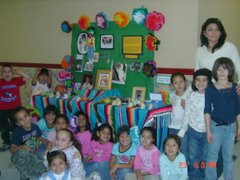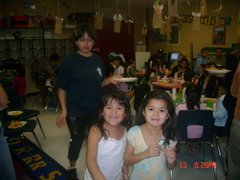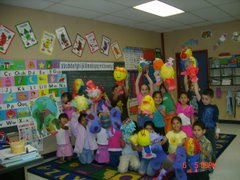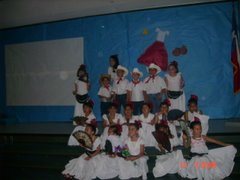Erika said...
Well althought the theories are very different, they all enphasized that human beings are predesposed to learn the skill, its just different processes or techniques that motivate or push the individual to learn it. I as an SL learner and teacher believe that everybody has the ability, however depending on different factors (background, socio-economic status, formal/informal education, etc.)is how we learn.
The culture place a huge role in language acquisition, especially here in the US, where we have a diverse number of cultures. I have seen how children from Hispanic speaking parents are reluctant to learn their parents language, and one of the reasons is because they feel that their language is seen by our society as a second class language. Also, in the other hand I have seen parents who don't want to teach their children their language because they still believe in the myth that if your don't learn English you won't succeed in this country.
How sad :( , anyways I am a stronger believer that interactions among families are important for L1 or L2 acquisition. In my country the interaction between children and adults is very common, I can see how children mature faster and their vocabulary is very extensive. On the other hand, I don't see that interaction here in the families in the US, maybe because of the rythm of life or society, I don't know, but many of the students that I work with come with very limited vocabulary and I think that one of the reasons is because of their limited interaction with adults. Yes, that is a very big difference between English and non-English speking population.
June 6, 2007 11:31 AM
Subscribe to:
Post Comments (Atom)
.JPG)




4 comments:
Erika,
Sin querer creo que pusimos casi lo mismo. Yo tambien pienso que estos factores (background and SES) son cruciales en el aprendizaje de cualquier idioma o materia.
PoLo
I would have to agree with you Erica, there is a growing gap of interaction between children, and their parents. Society now in the United States show growing trends of both parents having to work to exaushtively to make it. There is a growing trend of children having to stay long hours alone without any parental interaction. In order for children to truley learn more concretely their first and second language there needs to be more interaction.
I agree with you that it is sad how many parents see their own language as "second-class". I don't have any advice, just wanted to say that I empathize with your situation and I appreciate the work that you do in schools despite all of the socio-cultural odds that come against bilingual teachers every day.
Erika, yes, I agree with you that background, socio-economic status as well as formal or informal education has a tremendous impact in learning. However, as bilingual educators, we are aware of the needs of our population. Is it an easy job? No, but we love teaching and when we see our students' grow academically, we remember why we became educators.
Post a Comment